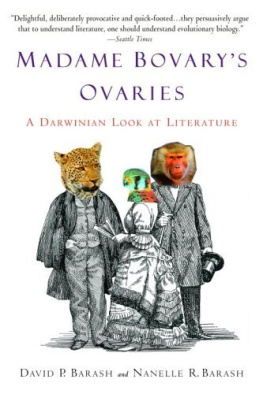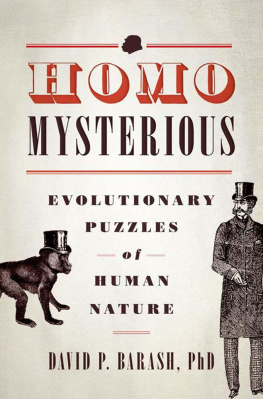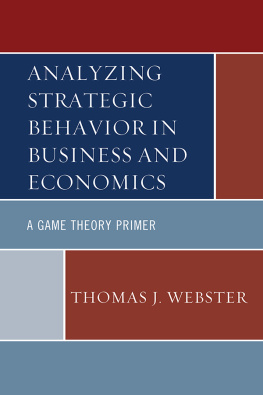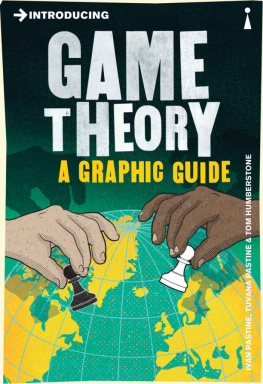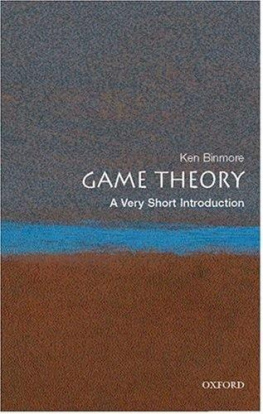In Molires play Le Bourgeois Gentilhomme, Monsieur Jourdain is astonished to learn that all of his life, without knowing it, he has been speaking prose. We are a bit like M. Jourdain: without knowing it, we all play games. It is not necessary to be athletic, or competitive, or especially frolicsome. Game playing is a big part of life. And since we are full-time players, it behooves us to understand whats going on.
Here goes.
Most of us assume that life is straightforward, essentially under our own control. If we want something, and reach for it, we may succeed or fail. Either way, the outcome is widely thought to result from our actions alone. But in fact, what we get is often determined by factors out of our control: Maybe the object we are reaching for is too heavy, or too far away, or guarded by angry dragons.
For our purposes, there is a whole class of situations that are more complex and more interesting than these, circumstances in which the payoffthe gain we are seekingis limited by the fact that others are also reaching for the same goal. In cases of this sort, as the Rolling Stones proclaimed in a notable song several decades ago, you cant always get what you want. Why not? Because if someone else wants the same thing, and if he or she is pretty much as smart, fast, strong, and motivated as you, then somethings got to give. (Whether, in the end, you can get what you need, as the Stones also announced, is another question, and one that is even more complicated.)
Actually, games arise even if the players arent human beings. Animals also play games, whether they know it or not, just as people dowhether they know it or not. Thus, two bull elk may desire the same cow, with the success of each ultimately depending not just on what male number one does, but also on male number two. And, of course, the female is also likely to have something to say about the outcome. Whether people or animals (or even viruses), the important thing is that there is some sort of outcome, which is determined by the combined actions of two or more different players, whether their interests are shared, opposed, ormost commonlya little bit of each.
Lets get a bit more technical, but not much. There are many circumstances in which the interests of individuals are interdependent and yet in conflict, so that the payoff to individual A, who is pursuing a particular goal, depends on the actions of individual B, who may be pursuing the same goal. In these cases, the return to each playerwhich can be a person, animal, organization, country, or even a bacteriumis determined by the actions of both, taken together. Furthermore, each is in a sense at the mercy of the other, in two ways. First, the outcome to each party depends on the others actions, and second, it is often the case that neither can change the others behavior. It is one of lifes crucial constraints.
There are many variants on this theme. Consider, for example, one of the simplest: call it the Interrupted Telephone Call Game, a frustration that everyone has experienced. You are talking to a friend, long distance, and suddenly the conversation is cut off; you both get a dial tone. You want to resume talking, and so does your friend, but if you both dial up the other, neither one will get through! If you both wait, again you both lose. The only way to win is for one (either one) to redial and the other to wait. So this is a case in which the interests of both parties converge, and yet the payoff to each still depends on the independent behavior of the other.
Another way to put it: What is the best thing to do when confronted with the Interrupted Telephone Call Game? There is no simple answer here, since it depends on what the other person does. If she is going to call you, then you should wait. If she is going to wait, then you should call. Things get interesting whenas is usually the casethe two of you havent agreed in advance who will do what if your call is interrupted.
Although this is admittedly a trivial case, it points out something important about interactions of this sort: Two or more parties may each have a limited number of possible movesin this case, you and your friend can either dial or waitwith the payoff to each of you depending not just on what either of you do, but on what the other does at the same time. Moreover, neither can control the actions of the other. A poignant literary example comes from O. Henrys short story The Gift of the Magi, in which the young husband sells his cherished pocket watch in order to buy hair combs for his adored wife, whoindependentlyhas sold her precious and much-admired hair to buy a watch chain for him!
In some of the most interesting situations well be examining, the players are more competitive, if not overtly antagonistic. In such cases, each participant is typically trying to maximize his payoff while often simultaneously attempting to minimize the others return. (And each also knows that the other is trying to achieve the same thing: She knows that Im trying to seem smarter than her, so shell probably study this other case carefully, to get a jump, so Ill review this counter-example, to get ahead of her .) Interestingly, although experts in game theory typically assume this sort of conscious planning and counter-planning, it isnt strictly necessary. A gazelle knows that the cheetah is planning to catch it, and the cheetah knows that the gazelle knows this, and so forth. In this case, the knowledge is implanted by evolution rather than by conscious awareness, but nonetheless, the game goes on.
Competitive interactions of this sort, whether human or merely biological, are not only intriguing as intellectual exercises, but they can yield tremendous insight into important real-life dilemmas, whether interpersonal or involving whole societies. In other cases, two individualsor companies, or countriesfind themselves locked in a deeply frustrating dilemma, in which both players strive for their own best interest, but, as a result, both are worse off. This is not simply theory but, rather, painful and dangerous practice.
Take, for example, nuclear weapons in Pakistan and India. Each country is tempted by the prospect of gaining a nuclear advantage over the other; at the same time, each would be better off using its limited budget to enhance the welfare of its own impoverished people. But each country is also fearful of being taken advantage of by the other if it lets down its guard and forgoes nuclear weapons. And so, two countries that can ill afford such a dangerous and expensive competition find themselves locked in a nuclear arms race that does neither one any good and that, moreover, does harm to their own security and that of the rest of the world. Everyone would be better off if these two players would only do the right thing and stop their nuclear competition, but because each fears being suckered by the other, both see themselves as doomed to keep it up. As well see, arms races of this sort also occur between married couples, parents and children, and so on.
Once again, the biological world fits right in, although such natural arms races are less potentially lethal than their nuclear counterparts. Pity the poor peacock, for example, forced to grow a set of outlandish and metabolically expensive tail feathers, which threaten to get tangled in the undergrowth and serve no real purpose other than convincing the female that its possessor is better than his rivals. After all, if a particular peacock decided not to run this tail-feather race, such a presumably rational decision would place him at a disadvantage relative to the other males who decided to participate, and who, as a result, got the peahen.


